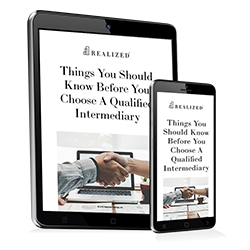
If you have been paying attention to previous Realized blogs, you know that we’ve written a great deal about Qualified Intermediaries (QIs) and their importance to successful 1031 exchanges. Without help from that experienced QI, the like-kind exchange could be derailed, and you could face triggered capital gain taxes.
QIs can also play a significant role when it comes to installment sales. Similar to managing several moving parts in a 1031 exchange, the Qualified Intermediary also brings powers of organization to a successful installment sale.
What Is an Installment Sale?
Before exploring a QI’s role in an installment sale, it’s a good idea to define what, exactly, this activity is. The installment sale is clearly outlined in the Internal Revenue Code; specifically, 26 U.S. Code § 453 – “Installment Method.” Under this code and section, the installment sale is defined as:
“. . . a disposition of property where at least one payment is to be received after the close of the taxable year in which the disposition occurs.”
In other words, with an installment sale, you (the seller) don’t receive a lump sum upon the property’s closing. Rather, you receive payments, in installments. By receiving only one installment payment a year after selling the property, your capital gain taxes are likely to be less.
Installment Sales and 1031 Exchanges
The installment sale process can be helpful as part of a like-kind exchange if that exchange ends up “straddling” two years. For example, if you close on your relinquished property between November 16 and December 31, the deadline to identify a replacement property can fall into a new tax year. And, if you were able to identify a potential replacement asset but that asset either fell out of escrow or closing was delayed, your QI will likely not hand over the proceeds from the relinquished property sale until the 180 day deadline has passed.
Under normal circumstances, this means you might be taxed on capital gains generated in the year during which you sold the relinquished property. But thanks to Section 453, you have the option of reporting your gain either in the year of your sale or in the year during which her proceeds are received.
The QI Role
Let’s get back to the QI now. As mentioned in previous articles, the Qualified Intermediary is responsible for holding proceeds from the sale of the relinquished property and then using those funds to close on the replacement property, as well as creating and managing required documentation. This would still hold true in an installment sale. In addition, according to IRS Publication 537, additional paperwork and organization might be required. For example, you might decide to assume the mortgage of the replacement property or even pay the seller’s expenses. Both of these require the skills and ability of a Qualified Intermediary.
In some cases, you may be required to establish an irrevocable escrow account from which you would receive installment payments. This is also something that a QI would help set up and oversee.
Again, because of the requirements of the like-kind exchange, you are not allowed to touch the proceeds from the sale of your relinquished property or use those proceeds to purchase your replacement property. That is all under the purview of the QI.
More Than an Exchange Helper
When it comes to discussing the Qualified Intermediary role in installment sales, the rule of thumb here is that if that sale is connected to a like-kind exchange, the QI needs to be involved. As such, before beginning any kind of 1031 exchange, be sure to have that individual in place and ready to help you out.
This material is for general information and educational purposes only. Information is based on data gathered from what we believe are reliable sources. It is not guaranteed as to accuracy, does not purport to be complete and is not intended to be used as a primary basis for investment decisions. It should also not be construed as advice, meeting the particular investment needs of any investor. Realized Holdings, Inc. does not provide legal or tax advice. Please consult with the appropriate professional regarding your own unique circumstances. There is no guarantee that the investment objectives of any particular program will be achieved. The actual amount and timing of distributions paid by programs is not guaranteed and may vary. There is no guarantee that investors will receive distributions or a return of their capital. These programs can give no assurance that they will be able to pay or maintain distributions, or that distributions will increase over time.



